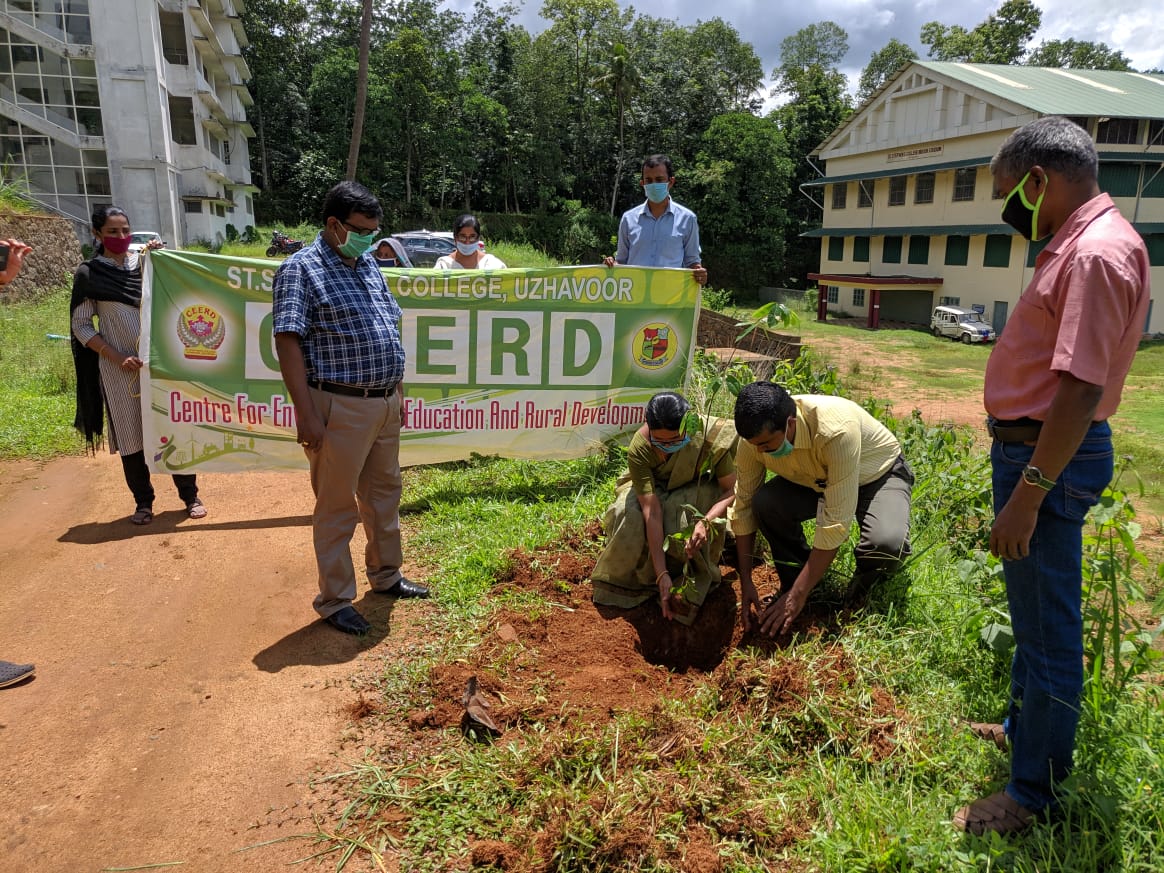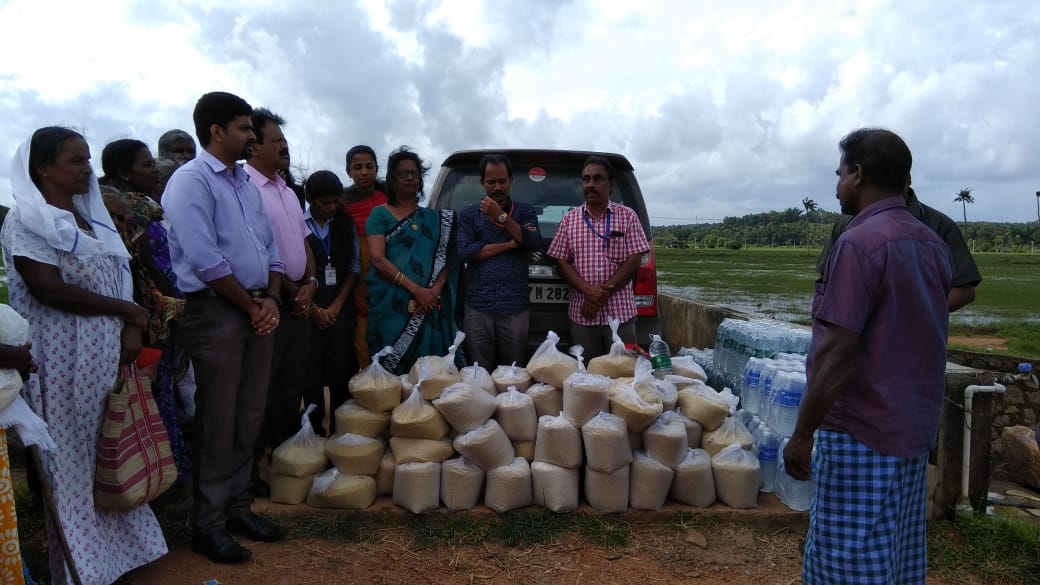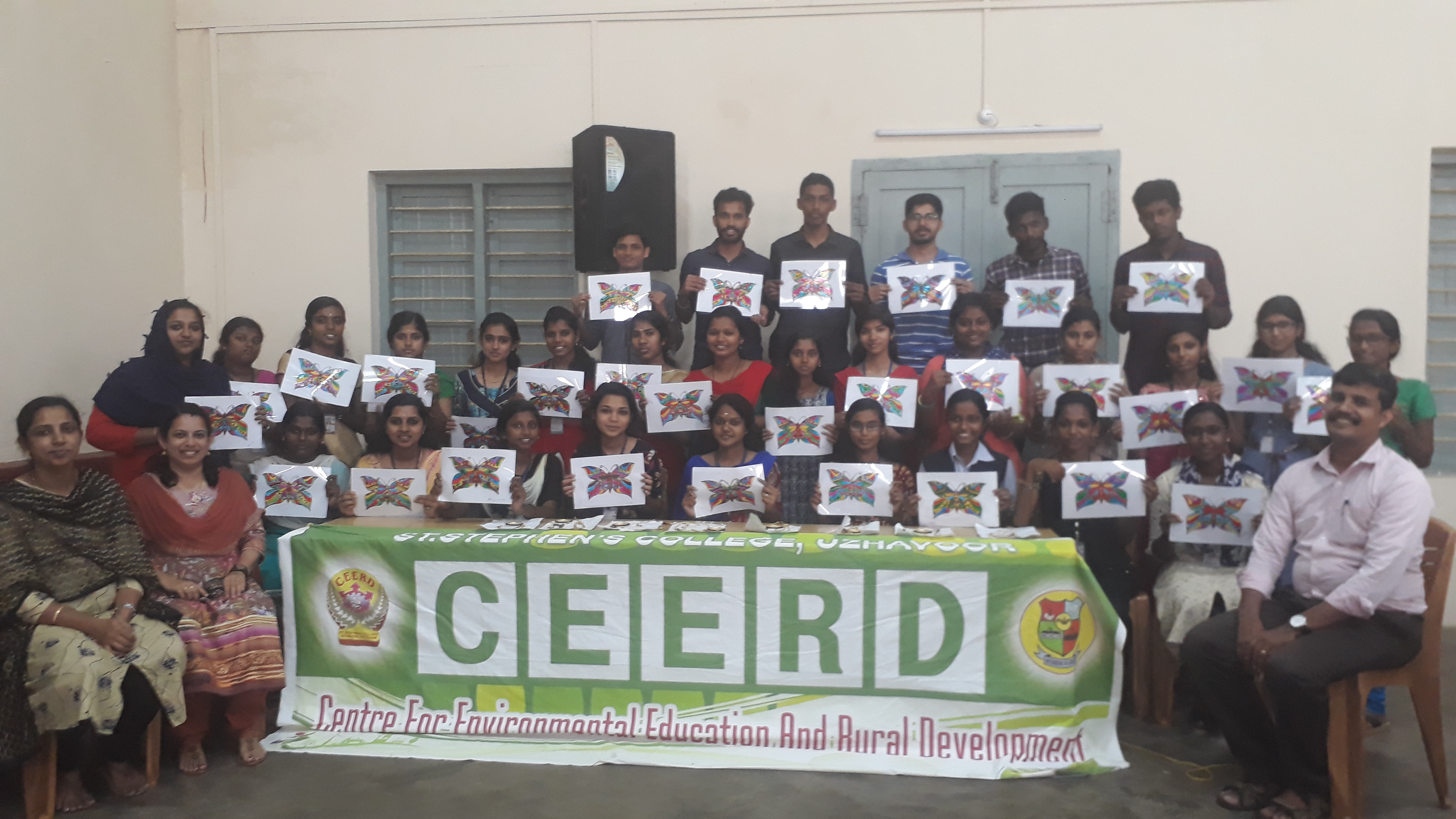GRAMA-MITHRA CAMPUS: College-Community Friendship
St. Stephen’s College was envisioned as an institution that would mould, enlighten, and empower generations of individuals and provide holistic education that would enable them to actively participate in community life and thus act as a companion to the region. In line with this vision and to foster eco-rural consciousness among students, The Centre for Environmental Education and Rural Development (CEERD) and Koodeyundu St. Stephen’s (St. Stephen’s is with you) has been established. Furthermore, all the departments and clubs of the college have equally contributed to the same.
Objectives
- To transform Uzhavoor Panchayath into a self-sufficient region through sustainable development and enhance the socio-economic progress of the rural community.
- To create a citizenry who are environment-conscious, socially committed and culturally rooted in the rich traditions of the village.
- To link the college with public and voluntary institutions in a mutualistic manner.
The Context
The college, sparked by its motto, Intendens in Caelum (Looking Up to Heaven) paved the way for higher education for the people of the region, who received only limited education. Recognizing the college's role in the overall development of the region is immense, it is incumbent to formulate initiatives like CEERD, Koodeyundu St. Stephen's, etc in the interest of the general public
CEERD, the brainchild of Prof. V. P. Thomaskutty and Prof. Joy Pallattumadam, was established in 2001 when the area lagged far behind in terms of basic amenities corresponding to rural development; and environment consciousness. Apart from offering support during natural disasters, Koodeyundu St. Stephen’s evolved as an extension activity during the pandemic to offer support.
The Practice
The uniqueness of St. Stephen’s College lies in its organisation of programmes which uphold social responsibility and environment consciousness for both students and community. This is done under the initiative of CEERD, Koodeyundu St. Stephen's, departments and clubs/cells.
One of CEERD’s significant initiatives include Paristhithi Mithra, an award instituted in 2009 for the best innovative practice for environmental management. The list of winners is mentioned below:
- 2010 –Dr . C.P Roy, MES College Nedumkandam
- 2011 – Shreyas Social Service Centre, Sulthan Bathery
- 2012 – Bodhana, Thiruvalla Social Service Society
- 2013 – MACFAST, Thiruvalla
- 2014 – Kottayam Social Service Society
- 2015 – Wayanad Social Service Society, Mananthavady
- 2016- St. Teresa’s College, Ernakulam
- 2016- Dr. K.P Joy, Chairman, Kerala State Environmental Impact Assessment Authority
- 2016 - Welfare Services, Ernakulam
- 2017- S.H College, Thevara
- 2017- Mr. C.D Adarsh Kumar, Poonjar
- 2018- Marthoma College, Thiruvalla
- 2018- Mrs. Ruby Thomas, Pala
- 2019- Tropical Institute of Ecological Sciences
- 2019- Sri. Sukumaran Nair, Secretary of Pampa Parirakshana Samithy
- 2020- Malabar Social Service Society, Kannur
- 2020- Sri. K Binu, Vazhoor
- 2021- St. Teresa’s College, Ernakulam
- 2021- Sri. Bulbendran, Adimali
The unit also arranges various competitions including a department-wise grow-bag cultivation competition.
Vermicompost units have been maintained for converting organic matter to manure since 2018.
Dustbins are provided in all the classrooms, departments and key areas for the safe disposal of solid wastes and also ensures separate collection and segregation of biodegradable and non- degradable waste from 2020.
Styrofoam glasses and plates are banned in the campus. The CEERD has taken initiatives to replace disposable cups/plates with steel utensils.
Activities associated with World Environment Day include plantation of saplings in the campus & distribution of the same to plant in houses.
Environment education trips are organised to make students more eco-sensitive. When demonetisation was announced in India, the students of the college assisted the common public in the process of exchanging currencies on 15 November 2016.
As part of water harvesting, a “Mazhakuzhi” (Rain-water harvesting pit) was dug on 5 June 2017.
Introduction of a Certificate course in ‘Environment and Sustainable development–Training & Practices’ in association with Kottayam Social Service Society (KSS) in 2018-19.
State-level and national seminars and workshops to encourage students, teachers and even the public are organised. These include:
- Seminar On Sustainable Development by Dr. MG Sanilkumar, S.N. College Maliankara on 8 September, 2018
- Seminar On Waste Management by Sri. Thomas KC, St. Stephen’s College, Uzhavoor on 13 October, 2018
- Workshop On Mushroom Cultivation by Dr. Sincy Joseph, St. Stephen’s College, Uzhavoor on 13 October, 2018
- Seminar On Climate Change by Dr. Pratheesh C. Mamman, from ICC, Kottayam on 5 January, 2019
- Invited Lecture On Environment Sustainability By Dr. Jomy Augustine, St. Thomas College, Pala on 08 February, 2020
- Cancer Awareness class by Dr. Amritha TS, Community Oncology Officer, Caritas Cancer Institute on 14 December, 2020
- A free mammogram and cancer care camp for the local women of age above 40 years from 7th-9th March, 2021
World food day was observed on 16th October 2018. Food stalls were set up with the sale of traditional food items to promote healthy eating.
Energy conservation campaigns were undertaken and diverse workshops and skill-development programmes were offered in the making of paper-bag, paper-pen, cloth mat and other eco-friendly products on 20 September 2018 and 04 January 2020; training to produce green products with paper-craft and coconut leaves on 2nd October 2019; as well as jewellery-making, glass-painting on 31st August, 2019.
Field visits arranged like the visit to Chaithanya on 9 Feb 2019; Iravikulam National Park on 17-01-2020, etc included sessions on green audit, organic farming, soap & detergent preparation, animal husbandry, bio-compost preparation, etc.
Roof-top vegetable cultivation has been practised since 16 September, 2019 and the harvested fruits and vegetables were distributed to the students and staff.
Inauguration of ‘Onathinorumuram Pachakkary Challenge’(A Vegetable Challenge Programme for Onam) was conducted on 22nd August 2019 to promote organic farming. Furthermore, 100 steel glasses were handed over to the college canteen as an eco-friendly initiative. Seeds & grow bags were distributed to students, staff and the public.
A three-week English grammar and Maths coaching class for school students was conducted for OLLHSS students from 6 May to 31 May 2019.
Complete digitalization of the details of farmers was conducted on 05 December 2021 and 13 December 2021.
Flood relief operations including book donations and cleaning flood-affected areas were organised in the years 2018-19 and 2019-20, through individual and combined efforts by the CEERD, NCC, NSS and departments/clubs.
Blood donation camps are conducted regularly.
A novel initiative of CEERD includes Koodeyundu St. Stephen’s, a collective venture of the college that comprises community-driven schemes/activities to assist the nearby local area and lead to the overall development of the rural area. These include:
- a COVID-19 help-desk, which offers following services: Vaccination support, Doctor’s Support, Blood donation, Transportation support, Emergency Support, Counselling Support, Support to Health workers, Support to Migrant Workers.
- webinars and workshops on relevant topics: Vaccine Registration workshop on 8th May 2021, Webinar on COVID-19 & the Role of student volunteers by Dr. Purushothaman K.K, Retd., Govt. Medical College, Thrissur on 17th May 2021, Webinar on Covid And Mental Health by Dr. Krishnan Sivasubramoney, Department of Psychiatry, Government T.D. Medical College, Alappuzha on 1 June 2021
- the college worked as a COVID testing centre
- offering aids to nearby hospitals based on requirements including donating a water heater to the Domiciliary Care centre run by Uzhavoor Panchayat on 24th June 2021; chairs to KR Narayanan Hospital, among many.
Apart from the abovementioned programmes, activities by diverse departments/clubs include:
- construction of sanitary-unit and durable assets
- book-donations to village libraries
- Swachh Bharat Pakwada (a two-week cleaning drive)
- Love Kottayam Project
- cleaning of public places
- financial-literacy programmes
- cloth-bag making workshops for Kudumbasree
- planting trees in public places
- visits to orphanages/destitute homes
- hair-donation campaigns
- Orange the World Campaign
- free eye-test camps for the public
- offering diverse public services, among many
Evidence of Success
St. Stephen’s College has carried out numerous extension activities under the umbrella of Grama-Mithra Campus. This has taken students outside classrooms giving them a diverse learning experience. It has made them more conscious of the requirements of society and the environment and progressed a spirit of social obligation. The strong social orientation imparted to students was strongly revealed during the floods that ravaged Kerala and specifically during the COVID-19 pandemic, when 224 students and majority faculty members volunteered to offer their help in diverse ways through Koodeyundu St. Stephen’s. Specifically, 476 people benefitted from the same.
Distribution of plant saplings/seeds, Paristhithi mithra Award, environment education trips, among other activities has enlightened and inspired students to be guardians of the environment. In addition, other eco-rural activities conducted have also imparted a profound social responsibility among students.
Problems Encountered and Resources Required
One limitation of the programme is that even though the system needs a lot to be done by the younger generation for their surroundings, the education strategy does not allow a full swing mode of action on this type of extracurricular activities. Another significant issue experienced is absence of time to lead extension activities in view of their scholastic obligations. Though students can spread consciousness and concern, the dimension tends to be limited except if the program is connected to significant government plans or other NGOs.


